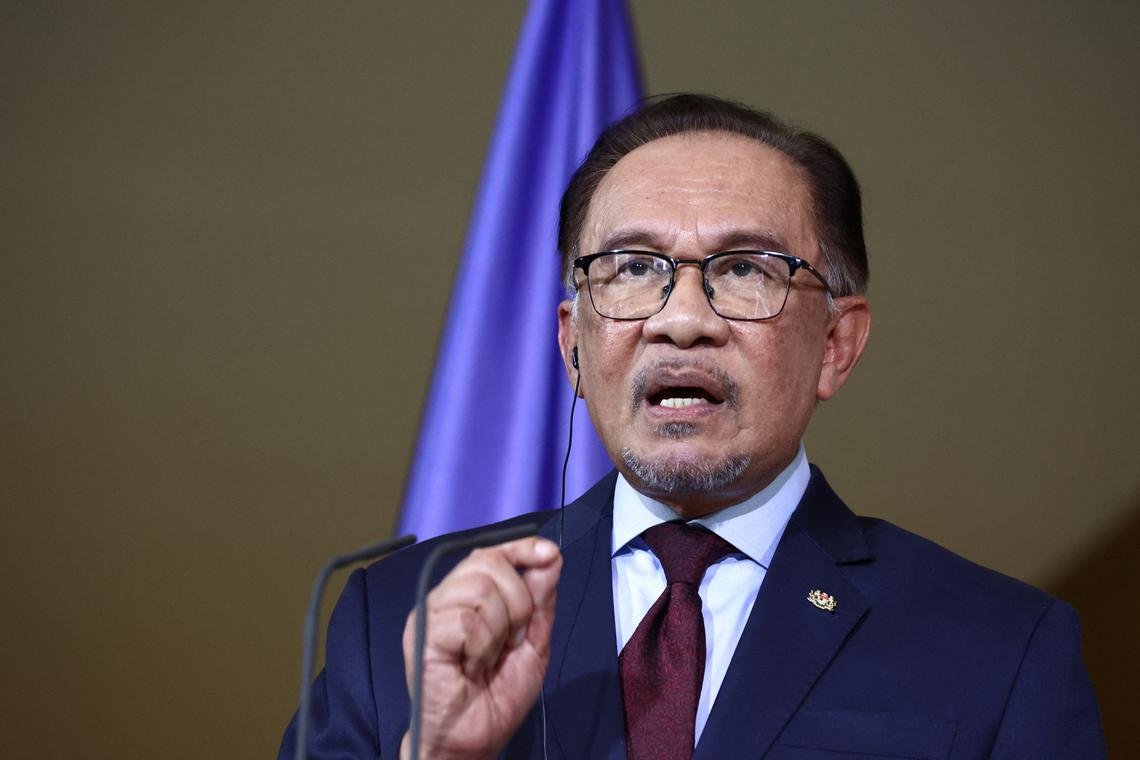KUALA LUMPUR – Malaysia is still uncertain if its partnership with Brics – an alliance of emerging economies – will have any adverse impact on its trade relationship with the United States, following President Donald Trump’s warning that any attempt by Brics member countries to replace the US dollar as a reserve currency will be hit with 100 per cent tariffs.
Prime Minister Anwar Ibrahim told Parliament on Feb 4 that the Cabinet is preparing for all eventualities when it comes to any decision made by the Trump administration, due to geopolitical uncertainties.
“We cannot make any hasty decisions. We are still unsure of its impact on the country. Therefore, we must prepare at the Cabinet level and a few special committees for any eventuality. Our involvement with Brics is still at an early stage,” said Datuk Seri Anwar.
Brics, which originally consisted of Brazil, Russia, India, China and South Africa, has had discussions about establishing a new reserve currency. Now, the group has expanded to include Indonesia, Egypt, Ethiopia, Iran and the United Arab Emirates.
Malaysia is one of Brics’ nine partner countries, but is not a full-fledged member.
During the 2024 Brics summit in Russia in October 2024 which was also attended by the partner nations, the 10-member bloc had discussed the possibility of establishing a gold-backed currency as an alternative to the US dollar.
On Jan 31, President Trump repeated his threat to Brics members to impose 100 per cent tariffs should they go down the de-dollarisation route.
“We are going to require a commitment from these seemingly hostile Countries that they will neither create a new BRICS Currency, nor back any other Currency to replace the mighty US Dollar or, they will face 100 per cent Tariffs,” Mr Trump said on his Truth Social social media platform in a statement similar to one he posted in November 2024.
But the Kremlin brushed off the threat, saying there was no such plan. Kremlin spokesperson Dmitry Peskov said Brics was not talking about setting up its own currency, but creating joint investment platforms for third countries.
Responding to a question by Bagan MP Lim Guan Eng over the possibility of US tariffs affecting Malaysia, Mr Anwar said that the government is still negotiating with the US, but Malaysia cannot adopt a wait-and-see approach.
Instead of waiting for the impact of potential US trade tariffs, Mr Anwar said Malaysia needs to continue diversifying its exports and not rely on a few trading partners. As such, Malaysia will actively build trade relations with other countries, such as China, Russia and Brazil.
“On our part, we must take proactive steps… to aggressively open a wider network of trading partners,” he said.
Mr Anwar noted that the US market makes up around 11 per cent of Malaysia’s exports. According to the World Bank, as of 2022, Malaysia’s exports to China made up nearly 14 per cent of its total exports.
China is Malaysia’s second-largest trading partner after Singapore, followed by the United States in third place, while Russia and Brazil are not major trading partners.
Speaking to The Straits Times, senior economist Professor Yeah Kim Leng said that a 100 per cent tariff would substantially diminish the value and amount of Malaysia’s exports to the US, because the resulting higher prices of Malaysian goods make them less competitive in the US market.
Among the major Malaysian products bound for US shores are semiconductors, integrated circuit boards, machinery and mechanical appliances.
“There is a risk that if we cannot find an alternative market, our semiconductor sector will be severely affected,” said Prof Yeah, who is a director of the Economic Studies Programme at Sunway University’s Jeffrey Cheah Institute on South-east Asia.
“A critical strategy is for Malaysia to harness American manufacturing firms operating in the country and see if they can lobby or directly appeal to the Trump administration, as these chips are used for their own domestic consumption,” he told ST.
It would be self-defeating for the US to impose tariffs on products made by American firms overseas for their own home market, the academic said. It would not be economical or practical for US tech giants such as Intel, Advanced Micro Devices (AMD) Inc, Hewlett-Packard (HP) and National Semiconductor Corp – which have been operating in Penang since the 1970s – to pack up and find a new base to operate from, he added.
In any event, Prof Yeah said the US president’s warning to Brics could simply be a negotiating tool, seeing as how he recently agreed to hold off imposing 25 per cent tariffs on Canada and Mexico for 30 days.
“We will likely see Malaysia negotiating to avert the US from imposing such a drastic measure. More importantly, Malaysia is still not a full-fledged Brics member.
“There could be room for Malaysia to perhaps delay entry to be a full member until there is greater clarity on Trump’s strategy in dealing with Brics nations,” he said.
- Azril Annuar is Malaysia Correspondent at The Straits Times.
Join ST’s Telegram channel and get the latest breaking news delivered to you.
